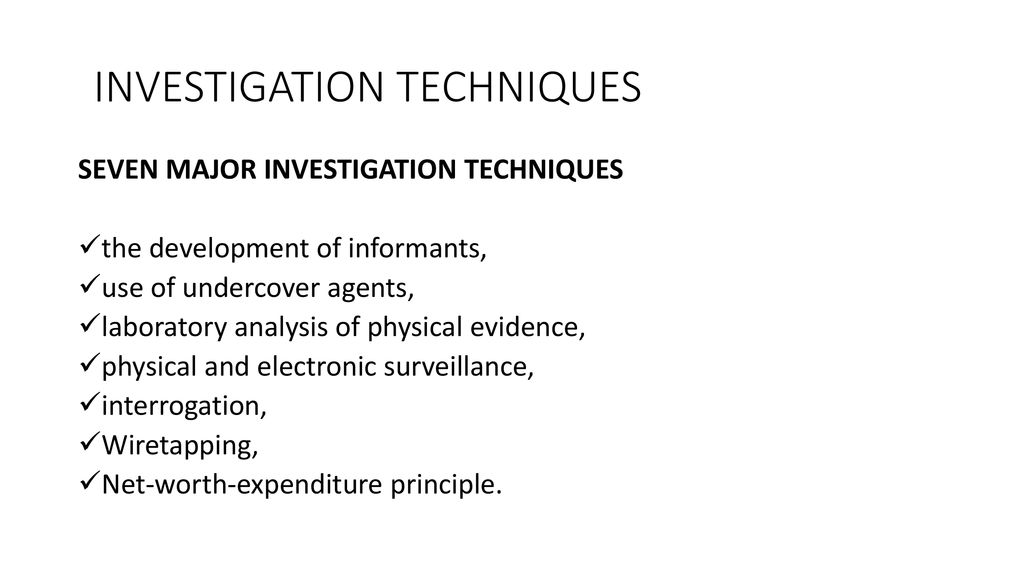Unveiling Crime: Effective Criminal Investigation Techniques


The Art and Science of Criminal Investigation Techniques
Criminal investigation is a multifaceted process that involves a combination of artistry and scientific methodologies. In this article, we delve into the intricate world of criminal investigation techniques, exploring the methods employed by law enforcement to unveil the truth behind criminal activities.
Forensic Science: Unraveling Clues from the Crime Scene
One of the cornerstones of criminal investigation is forensic science. Forensic experts meticulously examine crime scenes, collecting and analyzing physical evidence. From DNA analysis to fingerprint matching, these techniques provide crucial leads that aid investigators in piecing together the puzzle of criminal events.
Interrogation and Interviewing: Extracting Information Strategically
Effective communication is paramount in criminal investigations. Interrogation and interviewing techniques are employed to extract information from witnesses, victims, and suspects. Skilled investigators use strategic questioning, active listening, and psychological insights to elicit valuable details that contribute to the investigative process.
Surveillance and Undercover Operations: Monitoring Criminal Activities
Surveillance and undercover operations play a vital role in tracking and monitoring criminal activities. Investigators discreetly observe suspects, gather intelligence, and infiltrate criminal networks to collect evidence. These covert techniques are essential for understanding the dynamics of illicit operations and identifying key players.
Criminal Profiling: Understanding Offender Behavior
Criminal profiling involves creating a psychological and behavioral profile of potential offenders. Profilers analyze crime scenes, victimology, and other factors to develop insights into the likely characteristics of the perpetrator. This technique aids investigators in narrowing down suspects and prioritizing investigative efforts.
Cybercrime Investigation: Navigating the Digital Frontier
In the age of technology, cybercrime investigation has become a critical component of criminal investigations. Investigators employ digital forensics, analyze computer systems, and trace online activities to uncover evidence related to cybercrimes. Staying abreast of technological advancements is crucial in addressing the evolving landscape of digital crime.
Coordinated Task Forces: Collaborative Investigation Efforts
Complex criminal cases often require the expertise of multiple agencies. Coordinated task forces bring together investigators from different disciplines and organizations to pool resources and share insights. This collaborative approach enhances the collective capability to solve intricate cases that span jurisdictions.
Crime Analysis and Data Mining: Leveraging Information
Crime analysis involves the systematic study of crime patterns, trends, and statistics. By leveraging data mining techniques, investigators can identify patterns and correlations that might go unnoticed through traditional methods. This analytical approach aids in proactive crime prevention and informed decision-making.
Cold Case Investigations: Pursuing Justice Across Time
Cold case investigations involve reopening unsolved cases, often years after the initial incident. Investigators employ a fresh perspective, applying advanced forensic technologies and revisiting witness statements. The goal is to bring closure to victims and their families, demonstrating the commitment to pursuing justice regardless of time elapsed.
Legal and Ethical Considerations: Upholding Justice
Throughout the investigative process, adherence to legal and ethical standards is paramount. Investigators must ensure that evidence is collected legally, and the rights of individuals are respected. Upholding justice includes conducting fair and impartial investigations while respecting the principles of due process.
Continuous Training and Adaptation: Staying Ahead in Investigations
The field of criminal investigation is dynamic, with new challenges emerging regularly. Continuous training and adaptation are essential for investigators to stay ahead of evolving criminal tactics and technological advancements. Investing in professional development ensures that investigators remain effective in their roles.
Exploring the Frontiers of Criminal Investigation Techniques
In conclusion, criminal investigation techniques encompass a diverse array of methods, each playing a crucial role in uncovering the truth behind criminal activities. From the precision of forensic science to the strategic artistry of interrogation, investigators employ a spectrum of techniques to navigate the complex world of crime. Explore further insights on Criminal Investigation Techniques at greatblogabout.org to deepen your understanding of this intricate field.







